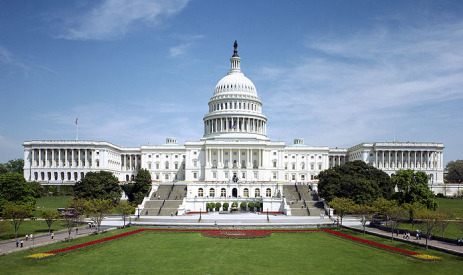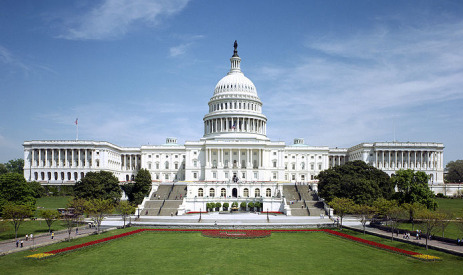
One-third of the Senate’s 100 seats were up for grabs yesterday, 23 of which were being defended by the Democratic party. Twelve months ago, that looked like an unenviable position. Today? It looks different.
Democrats prevailed in 22 of those 23 races and picked up seats that had been held by three Republicans — a net gain of two seats, bringing the party’s majority to 53. Two independents also won election: one, kinda-Socialist Bernie Sanders (I-Vt.), already caucuses with the Democrats; the other, Angus King (I-Maine), is likely to as well.
Last month, our Lisa Hymas looked at the climate, energy, and agriculture positions of candidates in four of these Senate races. In each of the four — Massachusetts, Missouri, Montana, and New Mexico — the candidate who had the stronger positions on these issues won. Thanks in part to Elizabeth Warren’s Massachusetts win, a full one-fifth of the Senate will be female for the first time in history.
It’s worth noting: This gain by Democrats will almost certainly not translate into strong climate action. For one thing, the new and returning Democratic senators are not uniformly supportive of strong climate action. For another, the House of Representatives has not been moderated at all from its staunchly anti-environmental positions.
Senate results
Here are the race outcomes, state-by-state, with winners listed first and some relevant details on the non-incumbent winners.
Arizona: Jeff Flake (R) 50.4% – Richard Carmona (D) 45.2%
Flake was cosponsor, with former Rep. Bob Inglis (R-S.C.), of a bill that would have implemented a carbon tax in lieu of cap-and-trade. It was (obviously) not made law. His candidacy was strongly opposed by some environmental groups, in part because of his past work in the mining industry.
California: Dianne Feinstein (D, incumbent) 61.4% – Elizabeth Emken (R) 38.6%
Connecticut: Chris Murphy (D) 55% – Linda McMahon (R) 43.3%
McMahon failed in her bid to bring to Washington any of the razzle-dazzle that was a staple of her former employer, the WWE. Had it been the WWF, she might have attracted more support from environmental groups; as it was, the League of Conservation Voters labeled her one of its “Dirty Dozen.”
Delaware: Tom Carper (D, incumbent) 66.4% – Kevin Wade (R) 29%
Florida: Bill Nelson (D, incumbent) 55.1% – Connie Mack (R) 42.3%
Hawaii: Mazie Hirono (D) 62.6% – Linda Lingle (R) 37.4%
Hirono, a sitting member of the House, gave this speech in favor of the Clean Air Act and the EPA, which is alright with us.
Indiana: Joe Donnelly (D) 49.9% – Richard Mourdock (R) 44.4%
Mourdock exemplifies one of the reasons the Democrats gained seats in the Senate. Backed by the Tea Party during the primary, he advanced past the incumbent moderate-but-not-great Sen. Dick Lugar, and then decided, a few weeks before Election Day, to tell everyone his feelings about rape.
Maine: Angus King (I) 53.2% – Charles Summers (R) 30.5%
Gov. Angus King won his race in part thanks to the support of the LCV and the Sierra Club, who touted his support of clean energy.
Maryland: Ben Cardin (D, incumbent) 54.1% – Dan Bongino (R) 27.6%
Massachusetts: Elizabeth Warren (D) 53.7% – Scott Brown (R, incumbent) 46.3%
You’ve probably heard about this race. If not, here’s how Warren stacked up against Brown on climate.
Michigan: Debbie Stabenow (D, incumbent) 58.3% – Peter Hoekstra (R) 38.4%
Minnesota: Amy Klobuchar (D, incumbent) 65.2% – Kurt Bills (R) 30.6%
Mississippi: Roger Wicker (R, incumbent) 57.2% – Albert Gore (D) 40.5% (no, not that Al Gore)
Missouri: Claire McCaskill (D, incumbent) 54.7% – Todd Akin (R) 39.2%
(See Mourdock, Richard.)
Montana: Jon Tester (D, incumbent) 48.9% – Denny Rehberg (R) 44.6%
While good on other issues, Tester is an open supporter of the Keystone XL pipeline.
Nebraska: Deb Fischer (R) 58.2% – Bob Kerrey (D) 41.8%
This was the only seat that the Democrats lost, the one held by the retiring Ben Nelson, a moderate’s moderate with a score of 55 (out of 100) from the LCV. So the election of Fischer, while a drop — Fischer was quite unpopular with local green groups — isn’t exactly a plummet.
Nevada: Dean Heller (R, incumbent) 45.9% – Shelley Berkley (D) 44.7%
New Jersey: Bob Menendez (D, incumbent) 58.4% – Joe Kyrillos (R) 39.9%
New Mexico: Martin Heinrich (D) 51% – Heather Wilson (R) 45.4%
Heinrich was another candidate who got support from LCV, which put out this strong ad:
New York: Kirsten Gillibrand (D, incumbent) 72% – Wendy Long (R) 26.5%
North Dakota: Heidi Heitkamp (D) 50.5% – Rick Berg (R) 49.5%
The North Dakota results are pretty amazing. Hand-wringing skeptics thought the state’s simple voter registration laws and advocacy by oil companies meant doom for Heitkamp. Even Nate Silver of the New York Times expected her to lose. She didn’t.
Representing oil-rich North Dakota, it’s unlikely that she’ll be a champion of strong environmental policy. She’s a supporter of the Keystone XL pipeline, for example.
Ohio: Sherrod Brown (D, incumbent) 50.3% – Josh Mandel (R) 45.1%
Pennsylvania: Bob Casey (D, incumbent) 53.6% – Tom Smith (R) 44.7%
Rhode Island: Sheldon Whitehouse (D, incumbent) 65.1% – Barry Hinckley (R) 34.9%
Tennessee: Bob Corker (R, incumbent) 65% – Mark Clayton (D) 30.4%
Texas: Ted Cruz (R) 56.6% – Paul Sadler (D) 40.5%
One of the Tea Party’s few successes, Cruz rolled to victory in both the primary and general elections. True to the state he represents, he’s bullish on energy production. Ted Cruz is a name you will hear again.
Utah: Orrin Hatch (R, incumbent) 65.2% – Scott Howell (D) 30.2%
Vermont: Bernie Sanders (I, incumbent) 71.1% – John MacGovern (R) 24.9%
Virginia: Tim Kaine (D) 52.4% – George Allen (R) 47.6%
Gov. Tim Kaine got some environmental support during his run, including for his push to create green jobs [PDF].
Washington: Maria Cantwell (D, incumbent) 59.4% – Michael Baumgartner (R) 40.6%
West Virginia: Joe Manchin (D, incumbent) 60.5% – John Raese (R) 36.5%
Wyoming: John Barrasso (R, incumbent) 75.9% – Tim Chesnut (D) 21.6%
Wisconsin: Tammy Baldwin (D) 51.4% – Tommy Thompson (R) 45.9%
It’s not only environmental policy that matters in politics. Rep. Tammy Baldwin will be the first openly gay woman to serve in the United States Senate. For fans of progress of any stripe, this is a remarkable achievement. That Baldwin was also given a 100 rating on the environment by the LCV is, in this instance at least, icing.
This post is part of our November 2012 theme: Post-election hangover — whither the climate?



